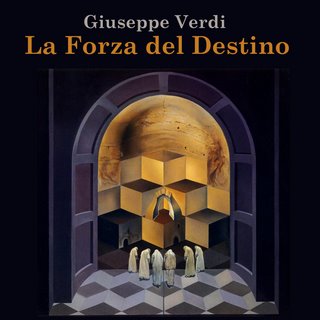 The performance of La Forza del Destino that I attended on March 18 was as good as anything I have seen at the MET in quite a while. It was not like the Forza performances of my childhood (Leontyne Price, Plácido Domingo, Sherrill Milnes) but few things these days are. This one came really close, though, and that was a pleasant surprise. I had recorded last Saturday's broadcast (pictured here is the cover that I designed for it), and I thought that it had turned out to be a very uneven performance. I am sure that when you get down to it, most of us were just happy that Forza was back at the MET. The cast changes on Saturday were excellent decisions: Samuel Ramey's unsteady, wobbly Padre Guardiano was replaced by solid bass Vitalij Kowaljow, and the roles of Don Carlo and Preziosilla were sung by Mark Rucker and Mary Phillips, replacing Mark Delavan and Ildiko Komlosi. Still in the cast were Deborah Voigt as Leonora, Salvatore Licitra as Don Alvaro, and Juan Pons as Fra Melitone. Mr. Licitra sang with greater conviction and more securely than in the broadcast. He was really impressive throughout the evening, producing a true Verdi sound. The same can be said of Mr. Pons who, with his huge but uneven voice these days, should begin exploring the comprimario repertory more often. Deborah Voigt's voice is not ideal for this role, and that's all there is to it. Although her tone is lovely, and she is able to produce some angelic sounds, the role requires a heftier, darker, more mature sound than she can deliver these days. The Metropolitan Opera Orchestra under Gianandrea Noseda sounded like a well-oiled machine, and played beautifully.
The performance of La Forza del Destino that I attended on March 18 was as good as anything I have seen at the MET in quite a while. It was not like the Forza performances of my childhood (Leontyne Price, Plácido Domingo, Sherrill Milnes) but few things these days are. This one came really close, though, and that was a pleasant surprise. I had recorded last Saturday's broadcast (pictured here is the cover that I designed for it), and I thought that it had turned out to be a very uneven performance. I am sure that when you get down to it, most of us were just happy that Forza was back at the MET. The cast changes on Saturday were excellent decisions: Samuel Ramey's unsteady, wobbly Padre Guardiano was replaced by solid bass Vitalij Kowaljow, and the roles of Don Carlo and Preziosilla were sung by Mark Rucker and Mary Phillips, replacing Mark Delavan and Ildiko Komlosi. Still in the cast were Deborah Voigt as Leonora, Salvatore Licitra as Don Alvaro, and Juan Pons as Fra Melitone. Mr. Licitra sang with greater conviction and more securely than in the broadcast. He was really impressive throughout the evening, producing a true Verdi sound. The same can be said of Mr. Pons who, with his huge but uneven voice these days, should begin exploring the comprimario repertory more often. Deborah Voigt's voice is not ideal for this role, and that's all there is to it. Although her tone is lovely, and she is able to produce some angelic sounds, the role requires a heftier, darker, more mature sound than she can deliver these days. The Metropolitan Opera Orchestra under Gianandrea Noseda sounded like a well-oiled machine, and played beautifully.This morning the following review of this performance was published in the New York Times.
Being Prepared for a Worst that Never Shows Up by Anne Midgette
At this point, the Metropolitan Opera production of Verdi's La Forza del Destino, now in the final week of its run, is like a piñata: everyone has taken a swing at it. And while the conventional wisdom about each individual performer has covered the entire spectrum of opinion, the aggregate has shaded toward "disastrous." So it seemed reasonable, on Saturday night, to brace for a train wreck.
But there was none: at most, there was an occasional horrifying screech of wheels at the crossing. This demonstrates two things: second casts may be better than first ones, and opera is an ever-changing art with performances that may vary from one night to the next.
The second cast was notably strong. A happy surprise was the vital, warm bass of Vitalij Kowaljow as the Padre Guardiano. Another was the baritone Mark Rucker, more than respectable as a stout Carlo. Mary Phillips, a mezzo-soprano, made her company debut on Wednesday as Preziosilla; on Saturday, she sounded slightly driven and brittle, despite an appealing instrument. (Mark Delavan and Ildiko Komlosi will resume the roles of Carlo and Preziosilla for the final performance on Thursday, but Mr. Kowaljow will remain.)
Deborah Voigt's Leonora has divided fans. To my ear, the role exposes her voice's lack of sheer heft. Her lovely shimmer — which worked for the final aria, "Pace, pace" — was not enough to carry her big Act II scene, the opera's emotional heart. Here, she came close to parody, breaking up the big arcs of her vocal line, aggressively rolling her r's, singing flat and gesticulating wildly.
Then there's the unpredictable Salvatore Licitra, once hailed as the next big thing in tenors, since castigated for sloppy performances. On Saturday, I thought he sounded great. His upper middle register remains the weakest part of his voice, but that weakness wasn't as glaring as I've heard it, and for the most part he sounded big and warm. His Act III aria, followed by the duet with Mr. Rucker, was some of the more satisfying Verdi singing I've heard in a while. Less satisfying was the conductor Gianandrea Noseda, with fast, driving tempos and heavy balances in the orchestra.
No comments:
Post a Comment